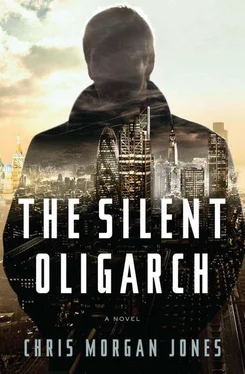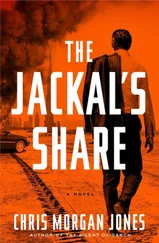Lock was in Moscow. He had flown back immediately after Paris and hadn’t been anywhere else since. Webster knew this because he had primed his source at the travel agency to check three times a day for bookings in the name of Richard Lock. So far there was nothing.
The plan, not yet fully formed, was that Onder would find an excuse to see Lock and gauge his mood. If he was feeling trapped, as Webster had to believe he would be, Onder would offer to make the introduction. The problem was that this couldn’t happen in Moscow, because it was too dangerous, and in any case Onder was not the sort of person one could send off on missions; everything had to fit with his schedule.
Hammer’s advice was clear and constant: just wait. We’re not in any hurry; our client wants us to stop spending money, and this way we don’t spend any until we have an opportunity that justifies it. But Webster lacked Hammer’s restraint, partly because he was consumed by the case, and partly because Hammer enjoyed waiting as part of the game. For all that Hammer was constantly in motion Webster admired his ability to sit still.
So as the rain fell in the gloom Webster struggled with the obvious truth that there wasn’t anything to do and tried to occupy himself with other projects. But two things happened that week nevertheless, and neither served to make him any calmer.
The Wednesday after his meeting with Tourna he received a call from Elsa at work.
“Have you seen this e-mail?”
“What e-mail?”
“You clearly haven’t.” Her voice was anxious, tight.
“I’m not in my office. What is it?”
“I don’t know. It’s in Russian. But it has our address on it.”
“Hold on. I’m nearly there. Let me see.” He sat at his desk and clicked on his screen. There was one new e-mail, from a Nicholas Stokes, the subject blank.
“I was at school with Nicholas Stokes.” He opened it.
“Then he has a strange sense of humor.”
The e-mail was addressed to Elsa, and he had been copied. It was laid out like a letter; in the top left-hand corner was Webster’s home address in Queen’s Park, complete with postcode. The body of the message was the full Russian text of an article from Kommersant reporting the death of Inessa. Webster had read it at the time; it was notable for being one of the few to print details of her writing. Otherwise the e-mail was empty: no introduction, no Dear Ben, nothing. He looked at it for a moment blankly, conscious that his heart was beating faster.
“What does it say?” said Elsa.
“It’s an article about Inessa. From just after she died.”
“What the hell for? Why is our address there?”
“I don’t know. I don’t know. It’s OK. Let me look at it.” He began to inspect it more closely. The name that had shown up in his inbox was Nicholas Stokes, but the e-mail address itself was borisstrokov5789@googlemail.com. The name meant nothing to him. He opened up the detailed information that showed the electronic path the e-mail had taken, but that too was meaningless.
“I don’t know what it is,” he said. “A message to me.”
“To us.”
“Hold on.” He searched for Boris Strokov on the Internet. Only a handful of results came back. “OK. Well, whoever sent it wants me to know that they know all about me. I haven’t seen Nick Stokes since I was seventeen. And they know our address.”
“And my e-mail.”
“And your e-mail. They’ve been busy.”
“Who is Boris Strokov?”
“I don’t know. Hardly any seem to exist.” By now he had discovered that Boris Strokov was a character dreamed up by Tom Clancy to inject Georgi Markov full of ricin on Waterloo Bridge. Russians, this meant, have a proud history of getting to people outside Russia. He kept the thought to himself.
“Ben, I hate this. I hate it. It’s your case, isn’t it?”
“Probably.”
“Probably? If it isn’t that what on earth is it?”
“It’s the case.”
“Right. And now they know where our children live. And they’re telling me, their mother, in an e-mail.” She paused. It occurred to Webster that that was the cleverest aspect of it. “Tell me this doesn’t scare you.”
“It doesn’t. I’ve had these things before. They’re unnerving.”
“Unnerving? That’s good. Well listen. I am unnerved. Distinctly unnerved. I don’t let my work intrude on our lives and I don’t think you should either.”
“Baby, look. You really shouldn’t worry. It’s a warning to the curious. They want me to stop work.”
“Then maybe you should.”
In his office Webster looked at the e-mail and shook his head. Instinctively he thought it through. If Malin was doing this it meant that he was rattled, and that could only be good.
“No. Not now. This doesn’t mean anything. It’s nothing.”
Elsa was silent on the other end of the line.
“Listen. If someone wants to hurt you they don’t tell you they’re going to do it.”
“But there’s no rule against it, is there?”
No. There was no rule.
OVER THE NEXT FEW DAYS the e-mail hovered on the edge of Webster’s thoughts, tugging insistently, the abuse of Inessa’s memory a constant barb. Elsa was tense. He tried to reassure her but his arguments, at once perfectly logical and somehow irrelevant, sounded hollow in his ear. The simple truth was that his pride wouldn’t allow such an ugly and simple device to have its effect. It was too base, too easy. If anything he felt newly galvanized.
That weekend the Websters left London for the south coast. They stayed in a cottage in Winchelsea, on a cliff a mile from the sea. They walked on the great beach at Camber Sands in the rain, with not a soul in sight; ate fish and chips in Rye; were chased by a herd of friendly bullocks on a farm. London and Moscow began to feel far away.
On the Saturday evening, Webster was reading to Daniel when his phone started buzzing in his pocket. He ignored it, finished the story, kissed him good night and went downstairs to the kitchen.
There was no message, and the call was from a Russian number he didn’t recognize. He dialed it, cradling the phone against his neck and taking a glass down from a shelf.
“Hello, this is Ben Webster. You just called me.”
“Ben. This is Leonard. Cahill. In Moscow.”
“Leonard. Good to hear from you. How are you?” He reached for a bottle of whisky and poured himself an inch, then a dash of water from the jug. He could hear Elsa walking around upstairs.
“Ben, have you heard from Alan? In the last few days.”
“He left me a voice mail last week.”
“When was that?”
“I was at Heathrow, so Thursday. Late afternoon.”
“Nothing since?”
“Nothing. Why?”
“He’s gone missing.”
Webster took a drink and put his glass down. “What sort of missing?”
“He was in Tyumen at the weekend. Then he had a story for us in Sakhalin. He never showed up. His wife saw him off on Monday morning and hasn’t heard from him since.”
“What was he working on?” Elsa came into the kitchen. She took a bottle of wine from the fridge and poured herself a glass. He mouthed “sorry” to her and stepped out into the hall.
“A piece about Sakhalin II. A puff piece. Nothing exciting. I was going to ask you the same thing.”
“He hasn’t done any work for me for six months.” This, of course, was strictly true.
“You don’t know what he was working on?”
“No. We talked about something but it never happened.”
“Fuck. His wife’s beside herself. Says he’s never done this before. Had he told you about his problems?”
“He mentioned something about the tax police.”
“I hope he hasn’t done anything stupid.”
Читать дальше












